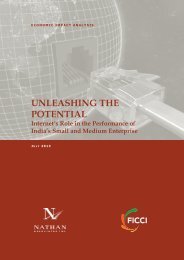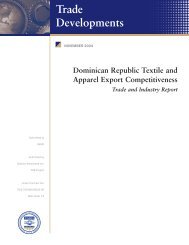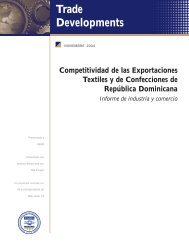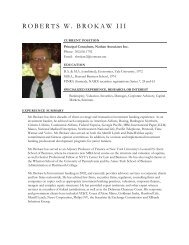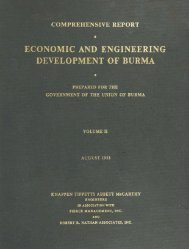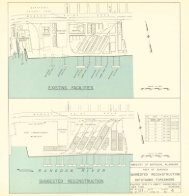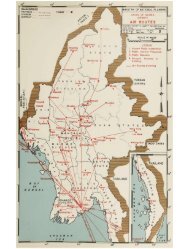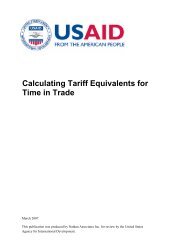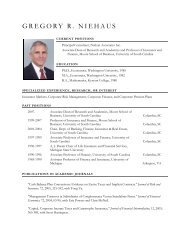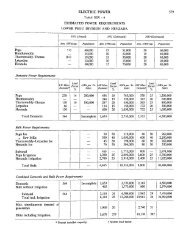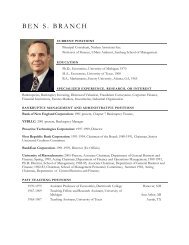Putting it to Work in Developing Countries - Nathan Associates
Putting it to Work in Developing Countries - Nathan Associates
Putting it to Work in Developing Countries - Nathan Associates
You also want an ePaper? Increase the reach of your titles
YUMPU automatically turns print PDFs into web optimized ePapers that Google loves.
equirement <strong>to</strong> export a certa<strong>in</strong> proportion of production<br />
or <strong>to</strong> use certa<strong>in</strong> domestic <strong>in</strong>puts. Double tax<br />
treaties often accompany BITs, and serve <strong>to</strong> m<strong>it</strong>igate the<br />
problems of double taxation that foreign <strong>in</strong>ves<strong>to</strong>rs may<br />
face <strong>in</strong> both the home economy and the host economy<br />
as a result of <strong>in</strong>come generated by foreign affiliates.<br />
3 UNCTAD, “Developments <strong>in</strong> <strong>in</strong>ternational <strong>in</strong>vestment<br />
agreements <strong>in</strong> 2005,” ILA Mon<strong>it</strong>or No. 2 (2006)<br />
International Investment Agreements,<br />
UNCTAD/WEB/ITE/IIA2006/7<br />
4 http://www.unctadxi.org/templates/Page<br />
____1007.aspx<br />
5 At the end of 2006, the Un<strong>it</strong>ed States had 39 BITs <strong>in</strong><br />
effect and another recently concluded. Western<br />
European countries have concluded the most BITs,<br />
though Ch<strong>in</strong>a now ranks second after Germany and<br />
Sw<strong>it</strong>zerland. The Un<strong>it</strong>ed States ranks about 25th.<br />
6 Although countries generally seek FDI and offer<br />
<strong>in</strong>centives (e.g., tax holidays or tariff exemptions on<br />
cap<strong>it</strong>al goods or raw materials) <strong>to</strong> attract <strong>it</strong>, many also<br />
adopt policies that impede <strong>in</strong>vestment. Such policies<br />
<strong>in</strong>clude exclusion of FDI from certa<strong>in</strong> sec<strong>to</strong>r (“negative<br />
lists”), cumbersome or arb<strong>it</strong>rary screen<strong>in</strong>g procedures for<br />
foreign <strong>in</strong>ves<strong>to</strong>rs, lim<strong>it</strong>s on percent of foreign ownership,<br />
domestic content requirements for <strong>in</strong>termediate<br />
<strong>in</strong>puts, employment restrictions, export balanc<strong>in</strong>g,<br />
restra<strong>in</strong>ts on rem<strong>it</strong>tance of prof<strong>it</strong>s, even nationalization<br />
or expropriation. These restrictions may arise from a<br />
desire <strong>to</strong> protect domestic <strong>in</strong>terests from compet<strong>it</strong>ion or<br />
<strong>to</strong> ma<strong>in</strong>ta<strong>in</strong> state-run monopolies, but their economic<br />
effects are negative.<br />
7 The provisions vary among the agreements. For example,<br />
the US–Australia FTA does not provide for<br />
<strong>in</strong>ves<strong>to</strong>r–state dispute settlement.<br />
8 Other RIAs conta<strong>in</strong> less than the full array of BIT<br />
rules or explic<strong>it</strong>ly discrim<strong>in</strong>ate aga<strong>in</strong>st third-party<br />
<strong>in</strong>ves<strong>to</strong>rs. The first regional efforts <strong>to</strong> <strong>in</strong>troduce rules on<br />
<strong>in</strong>vestment emphasized only free movement of cap<strong>it</strong>al<br />
and the right <strong>to</strong> set up and manage subsidiaries or agencies<br />
<strong>to</strong> pursue economic activ<strong>it</strong>y. The Treaty Establish<strong>in</strong>g<br />
the Caribbean Commun<strong>it</strong>y (1973) takes such an<br />
approach, as does the Treaty Establish<strong>in</strong>g the African<br />
Economic Commun<strong>it</strong>y (1991) and the Treaty<br />
Establish<strong>in</strong>g the Common Market for Eastern and<br />
Southern Africa (1993). In contrast, the MERCOSUR<br />
states’ <strong>in</strong>vestment policies have emphasized development<br />
and export promotion rather than economic efficiency.<br />
They have adopted a pro<strong>to</strong>col explic<strong>it</strong>ly lim<strong>it</strong><strong>in</strong>g the<br />
rights of third-party <strong>in</strong>ves<strong>to</strong>rs, and the pro<strong>to</strong>col conta<strong>in</strong>s<br />
no discipl<strong>in</strong>es on performance requirements. The<br />
Andean Commun<strong>it</strong>y and ASEAN have schemes <strong>to</strong> promote<br />
the creation of enterprises owned jo<strong>in</strong>tly by member<br />
country <strong>in</strong>ves<strong>to</strong>rs and extend preferential treatment<br />
<strong>to</strong> such enterprises.<br />
9 These <strong>in</strong>clude the Canada–Chile FTA (1997), the<br />
revised Convention establish<strong>in</strong>g the European Free<br />
Trade Association (2000), the Japan–S<strong>in</strong>gapore<br />
Economic Partnership Agreement (2002), and the current<br />
draft of the FTAA. The Non-b<strong>in</strong>d<strong>in</strong>g Investment<br />
Pr<strong>in</strong>ciples (1994) of the Asia-Pacific Economic<br />
Cooperation <strong>in</strong>corporate NAFTA-like provisions w<strong>it</strong>hout<br />
a b<strong>in</strong>d<strong>in</strong>g dispute settlement mechanism. The<br />
Co<strong>to</strong>nou Agreement between the EU and the African,<br />
Caribbean and Pacific States (2000) conta<strong>in</strong>s only general<br />
pr<strong>in</strong>ciples on <strong>in</strong>vestment but envisages the negotiation<br />
of side-BITs among signa<strong>to</strong>ries.<br />
10 Major controversies <strong>in</strong> WGTI discussions have<br />
<strong>in</strong>volved very basic issues, <strong>in</strong>clud<strong>in</strong>g def<strong>in</strong><strong>it</strong>ions of<br />
“<strong>in</strong>vestment” and “<strong>in</strong>ves<strong>to</strong>r,” transparency, technical<br />
assistance, and development provisions. However, w<strong>it</strong>h<br />
the <strong>in</strong>def<strong>in</strong><strong>it</strong>e suspension of the Doha Round <strong>in</strong> July<br />
2006, the WGTI’s future may be moot, and <strong>it</strong> may simply<br />
disband, as several develop<strong>in</strong>g countries advocate.<br />
11 In May 1995 m<strong>in</strong>isters of the 29 developed country<br />
members of the OECD began negotiat<strong>in</strong>g an agreement<br />
on <strong>in</strong>vestment. The three pillars of the negotiations were<br />
a broad multilateral framework for <strong>in</strong>ves<strong>to</strong>r protection,<br />
the liberalization of restrictions on <strong>in</strong>vestment, and an<br />
effective dispute settlement mechanism. Negotia<strong>to</strong>rs<br />
expected that develop<strong>in</strong>g countries might jo<strong>in</strong> the agreement<br />
once <strong>it</strong> was f<strong>in</strong>al. Although progress <strong>in</strong> ref<strong>in</strong><strong>in</strong>g<br />
<strong>in</strong>vestment pr<strong>in</strong>ciples was significant, they agreed <strong>to</strong> suspend<br />
negotiations <strong>in</strong> Oc<strong>to</strong>ber 1998 <strong>in</strong> light of differences<br />
on issues such as treatment of regional economic<br />
<strong>in</strong>tegration organizations and discipl<strong>in</strong>es on <strong>in</strong>vestment<br />
<strong>in</strong>centives and given the need <strong>to</strong> further consider concerns<br />
raised by environment and labor <strong>in</strong>terests. The<br />
parties term<strong>in</strong>ated negotiations <strong>in</strong> December 1998.<br />
12 Several developed countries (e.g., Japan, Canada,<br />
Australia) have not aggressively pursued BITs. Ch<strong>in</strong>a, on<br />
the other hand, is a major BIT participant, <strong>in</strong>clud<strong>in</strong>g<br />
w<strong>it</strong>h develop<strong>in</strong>g countries, possibly <strong>to</strong> facil<strong>it</strong>ate a strategy<br />
<strong>to</strong> establish textile and apparel manufactur<strong>in</strong>g operations<br />
<strong>in</strong> other develop<strong>in</strong>g countries <strong>to</strong> better m<strong>in</strong>e the<br />
global textile quota system. Other develop<strong>in</strong>g countries<br />
also participate <strong>in</strong> many BITs.<br />
13 See World Bank, “Do BITs <strong>in</strong>crease <strong>in</strong>vestment flows<br />
Only a b<strong>it</strong>,” <strong>in</strong> Global Economic Prospects and the<br />
Develop<strong>in</strong>g <strong>Countries</strong>, September 2003, p. 129.<br />
14 World Bank Trade Note, “From S<strong>in</strong>gapore <strong>to</strong><br />
Cancun: Investment,” May 29, 2003.<br />
15 Ste<strong>in</strong>, Ernes<strong>to</strong> and Christian Daude, 2001,<br />
“Inst<strong>it</strong>utions, Integration and Location of Foreign<br />
Direct Investment” <strong>in</strong> New Horizons for Foreign Direct<br />
Investment, pp. 101-128. Paris: OECD. See also<br />
Jaumotte, Florence, “Foreign Direct Investment and<br />
Regional Trade Agreements: The Market Size Effect<br />
Revis<strong>it</strong>ed” IMF <strong>Work</strong><strong>in</strong>g Paper WP/04/206.<br />
Wash<strong>in</strong>g<strong>to</strong>n: IMF.<br />
101



